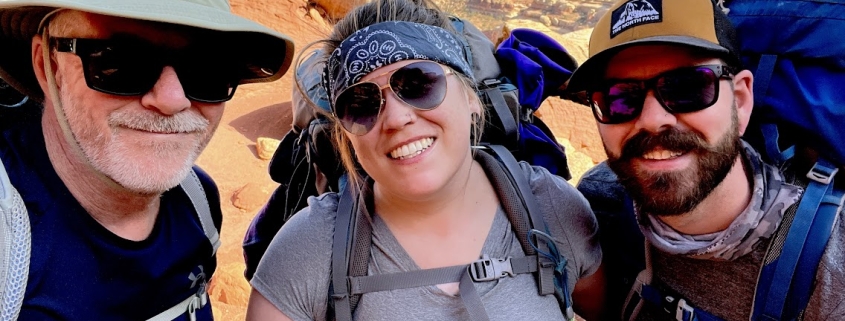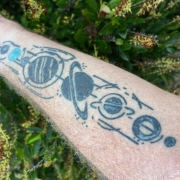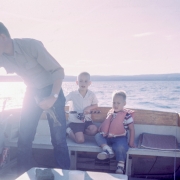How to Finish the Race of Life | Healthy Aging Series: S8, E4
This blog will continue examine the work, “Triumphs of Experience: The Men of the Harvard Grant Study,” written by George E. Vaillant.
How do we sucessfully finish the race of life?
Daniel LaRusso and Johnny Lawrence see life as a competition. Johnny is “jelly” because Daniel has a beautiful family, a very successful car dealership, and frankly Johnnie thinks Daniel believes he’s better than everyone else. Johnnie, is it an alcoholic and has a strange relationship with his son, and doesn’t have enough money to pay his rent.
They spend the first five or six seasons, literally fighting each other, miserable, and both languishing out the year. They not only failed to flourish, but failed to thrive. They both seem confused about what it means to flourish and what successful aging looks like. The Harvard Grant Study followed 268 men (the study, included a number of the other men that were part of the study, called the Inner-City Study) throughout their lives in over a period of 85 years.
Instead of depending on Johnnie and Daniel’s idea of aging, let’s look to this study and consider what the Harvard Grant Study determined as flourishing.
Decathlon of Flourishing
From age 60 to 80…
- Included in Who’s Who in America
- Earning income in the Study’s top quartile
- Low in psychological distress
- Success and enjoyment in work, love, and play since age 65
- Good subjective health at age 75
- Good subjective and objective physical and mental health at age 89
- Mastery of Ericksonian task of Generativity
- Availability of social supports other than wife and kids between 60 and 75
- In good marriage between 60 and 85
- Close to kids between 60 and 75
Take a look at this picture of aging. Keep in mind that this is not about longevity. We will look at longevity in our next blog. This is more about quality of life. If you’re like me, you’ll immediately dismiss the first two criterion, income and professional status. In my opinion, these do not always equal flourishing in our modern world. But the last four or eight assessments they boil down to:
1. Psychological well-being. Generally speaking, this criteria means good coping strategies and mental resilience.
2. Physical well-being. This means the ability to do the things that most people need to do to take care of themselves. This would include shopping, chores, self-care, and other things that we call activities of daily living.
3. Social supports. I think this means our connectivity to people, family, and friends.
Flourishing simply put means doing well, physically, mentally, and socially.
What Predicts Successful Aging?
The Director looked at several factors that contribute or were possible contributing factors to successful aging. I’m not going to go through that lengthy list of things they looked at, but I am going to share one identifying factor that strongly predicted successful aging. Can you guess what it was? Of all the factors that they looked at, which included things like: a warm childhood, overall college, soundness, and coping strategies, the fact that predicted successful aging, the most, was the ability to find and maintain friendships at middle age.
When the study looked at the Decathlon of Flourishing, finding and maintaining friendships had the highest predictability for scoring high on this standard for successful agent. Here’s what the study did. They took a snapshot of men at age 47 years old. Those men who had developed friendship skills flourished. Here is my take away: the skills that you need to maintain good friendships, are also the skills that promote healthy aging, or help you flourish as you age. It isn’t necessarily the friendships that lead to flourishing but the skills that you need to maintain those friendships.
So what skills promote making and maintaining adult friendships? Here is my list:
1. The ability to tolerate other people’s opinions.
The world is full of opinions. I reminded of the saying that I overheard often while in the military: opinions are like assholes, everyone has won it. And I might add: everyone is entitled to their opinion. Learning to tolerate, appreciate, come, and respect the opinions of others serves as a type of Teflon for your sake, and is essential for good friendships.
2. The ability to see other people as multi-dimensional beings.
Labels are a curse to friendships. No one is just Democrat, Republican, Christian, Muslim, atheist, mother, or father. No one is just one thing. We are all multifaceted, multi-dimensional people. People are complicated. We are better equipped to age and flourish if we see everything about the people in our lives.
3. The ability to forgive and forget when people have wronged us.
Friendships are healed by forgiveness. People who do not or cannot practice forgiveness become prisoners of the resentments. I know that forgiving others isn’t easy but harboring, resentment, and anger almost always turns into depression. If we can learn to forgive others, we can learn to forgive ourselves from that internal cancer that eats away at our sake.
4. Being generous with yourself, and with your things.
Your friends need you and benefit from the gift of yourself to them. I never loan money to a friend or family member. I give them what I have as a gift. My friends, my family, my world, is better, I am better, when I give them all generous portion of my cell.
5. Seeing everyone as a peer.
Nothing disarms, others better or more effectively than treating them the way you would want to be treated. Nothing disarms others better or more effectively then treating them the way you would want to be treated. We live in a world of status and we are made to feel less than others because of that. I have two masters degrees, a license, and several certificates, but everyone I meet I treat like a fellow traveler, fellow, struggler, and a fellow explorer. I’ll never forget the interview of Norman Lear when he was 93. The interviewer asked him how he maintain his youthfulness and he responded “I treat everyone like my peer.”
6. Being humble.
Putting others before yourself. This is a hard one, but egocentrism, self-centeredness is a constant threat to our friendships and to us. Learning to think not what your friends can do for you, but what you can do for your friends is a skill that promotes peace and harmony.
7. Balancing being a giver and a receiver.
There must be a balance in a relationships in the world. We cannot always be the giver, and we cannot always be the receiver. Those who are always giving become bitter, and those who are always receiving become a burden.
8. Reach out as often as you can.
You cannot have a relationship with others if you refuse to initiate your get togethers. Pick up the phone. Send a text. Set up a coffee, date or dinner, or a walk in the park. Reaching out ensures that you experience the richness of others. It allows others to infect you with their hope, optimism, and love.
9. Avoid giving unsolicited advice.
Stop giving your family, friends, children, spouses, partners, neighbors, employees, and for that matter anyone else unsolicited advice. Giving unsolicited advice is a subtle form of disapproval. It’s a subtle form of being judgmental. People hate it. You become a conditioned punisher, and people will avoid you. There is that old principle that I have heard many, many times that applies to this and all other friendship, skills, and it’s this: live and let live.
If you want to be a person who is aging successfully, then look at your life and determine what your adult friendships look like. I think as we age, we tend to be more intentional about our relationships and therefore we don’t linger with relationships that are toxic or dysfunctional. But we do nevertheless, have friendships and those friendships will indicate how well you age because of the skills that you have used to maintain these relationships.
Friendship skills are, in essence, successful aging skills.
To see more entries in the Healthy Aging series, click here.













